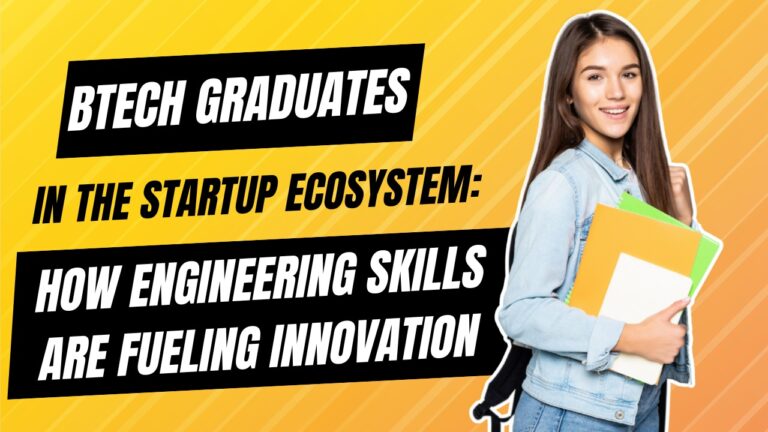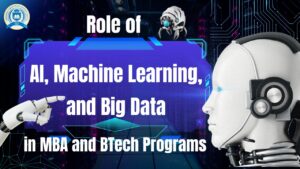
Imagine leading the next tech revolution—not just by building cutting-edge software, but also by strategically scaling it into a global...

Imagine leading the next tech revolution—not just by building cutting-edge software, but also by strategically scaling it into a global...

What do Flipkart, Ola, and Zerodha have in common? Apart from being some of India’s most successful startups, they were...

When we think of healthcare, we usually picture doctors, nurses, and medical equipment. But behind every successful hospital or healthcare...

Are you a BTech graduate wondering what’s next? You’re not alone. Every year, thousands of engineering students find themselves asking...

Imagine a computer so powerful it can solve problems in seconds that would take traditional supercomputers years. Sounds like science...

Imagine leading the next tech revolution—not just by building cutting-edge software, but also by strategically scaling it into a global product. Sounds exciting, right? Welcome to the evolving world of work, where the fusion of engineering and management skills is setting new benchmarks in innovation. As industries transform at breakneck

When we think of healthcare, we usually picture doctors, nurses, and medical equipment. But behind every successful hospital or healthcare startup is a team of professionals ensuring that everything runs smoothly—from budgeting and operations to policy decisions and strategic growth. That’s where the MBA in Healthcare Management steps in. If

Imagine a computer so powerful it can solve problems in seconds that would take traditional supercomputers years. Sounds like science fiction, right? Welcome to the world of quantum computing—a technology that’s no longer in the distant future but fast becoming a present-day reality. If you’re a BTech student, you have

In today’s fast-paced digital world, the fusion of technology with education is revolutionizing how we learn and what we learn. Artificial Intelligence (AI), Machine Learning (ML), and Big Data are no longer buzzwords confined to tech companies—they are now integral parts of modern MBA and BTech programs, especially those offered

In today’s fast-paced world, pursuing a Master of Business Administration (MBA) is a vital stepping stone for career advancement. However, traditional MBA programs can often be inflexible and costly. Enter distance learning platforms, a revolutionary approach that combines quality education with convenience and affordability. This blog post will guide you

Imagine leading the next tech revolution—not just by building cutting-edge software, but also by strategically scaling it into a global product. Sounds exciting, right? Welcome to the evolving world of work, where the fusion of engineering and management skills is setting new benchmarks in innovation. As industries transform at breakneck speed, the blend of BTech (Bachelor of Technology) and MBA (Master of Business Administration) has become one of the most powerful combinations to thrive in today’s hybrid economy. In this blog, we explore how these two degrees—when combined—are not just creating better professionals, but also driving disruptive innovation in technology and business. Whether you’re a student, a working professional, or an aspiring entrepreneur, understanding this synergy can shape your future in ways you never imagined. The Evolving Workplace—A Perfect Storm of Tech and Strategy The future of work is no longer about choosing between tech and business—it’s about integrating both. Rapid advancements in AI, automation, data analytics, and blockchain are changing the way companies operate, hire, and scale. At the same time, organizations need leaders who can understand how technology intersects with business goals, consumer needs, and market dynamics. Interesting Fact: According to a World Economic Forum (WEF) 2023 report, by 2027, over 50% of all workers will need to upskill or reskill to remain relevant. The report also highlights that roles combining tech and business acumen are expected to be among the fastest growing. Why BTech + MBA is the Power Combo of the Future 1. Tech-Driven Decision Making A BTech degree teaches the fundamentals of engineering, system design, and technical problem-solving. Pair that with the strategic thinking, leadership, and financial acumen of an MBA, and you get professionals capable of making data-backed, tech-informed decisions at the leadership level. 2. Versatility Across Industries Whether it’s fintech, healthtech, edtech, e-commerce, or supply chain, companies want leaders who understand both the technology stack and the business model. A BTech + MBA profile fits perfectly across these verticals. 3. Startup and Entrepreneurial Edge From Flipkart to Ola, India’s startup ecosystem is full of engineers who used their tech background to solve a real-world problem—and then used business skills to scale. An MBA gives BTech graduates the vision, funding knowledge, and market insight needed to transform a prototype into a profitable enterprise. Real-World Impact—Case Studies of Tech-Business Innovators These aren’t isolated examples. They reflect a larger trend of engineers evolving into business leaders, driving transformation at scale. Rise of Dual-Skilled Professionals Employers are actively seeking professionals who can bridge the gap between IT teams and executive boards. In fact, a 2023 LinkedIn report showed a 46% increase in job postings demanding cross-functional expertise—especially roles like: With hybrid roles becoming more mainstream, a single-skill approach is no longer enough. Top MBA Specializations for BTech Graduates If you’re a BTech grad considering an MBA, choosing the right specialization is crucial. Here are the top trending ones aligned with future work roles: Way Forward—Preparing for the Future of Work So, how can students and professionals future-proof themselves? Conclusion As we enter the era of intelligent automation, global connectivity, and digital disruption, companies aren’t just looking for coders or strategists—they’re seeking leaders who can do both. A BTech + MBA combo is no longer just a career move; it’s a strategic advantage in a future defined by innovation, collaboration, and continuous evolution. So, if you’re on the fence about blending tech and business education, remember: the future of work belongs to those who can innovate, integrate, and lead.

When we think of healthcare, we usually picture doctors, nurses, and medical equipment. But behind every successful hospital or healthcare startup is a team of professionals ensuring that everything runs smoothly—from budgeting and operations to policy decisions and strategic growth. That’s where the MBA in Healthcare Management steps in. If you’ve ever wanted to be part of transforming the healthcare sector without being a medical professional, this could be your calling. With rising demands for better healthcare infrastructure, skilled healthcare managers are now more essential than ever. According to the U.S. Bureau of Labor Statistics, jobs in medical and health services management are projected to grow by 28% from 2022 to 2032, much faster than the average across industries. Clearly, healthcare isn’t just about saving lives—it’s also about managing systems, people, and innovations. And that’s what an MBA in Healthcare Management empowers you to do. What is an MBA in Healthcare Management? An MBA in Healthcare Management is a specialized program that combines traditional business disciplines—like finance, marketing, HR, and operations—with core healthcare knowledge. This includes hospital administration, healthcare policy, patient services, and medical ethics. The goal? To create healthcare leaders who understand both the language of medicine and the metrics of business. Whether you’re aiming to manage hospitals, work in health insurance, lead public health initiatives, or join healthcare startups, this program prepares you to navigate the complexity of a rapidly evolving sector. Why is Healthcare Management So Critical Today? The healthcare industry is undergoing a massive transformation—fueled by technology, increased life expectancy, pandemics, and shifting patient expectations. Here’s why the demand for skilled managers in this field is surging: According to IBEF (India Brand Equity Foundation), the Indian healthcare market is expected to reach $638 billion by 2025, making it one of the fastest-growing sectors. The opportunity for impactful leadership has never been greater. Skills You’ll Gain with an MBA in Healthcare Management This program doesn’t just offer knowledge—it equips you with practical, job-ready skills, such as: These skills are critical in helping organizations improve patient outcomes, reduce costs, and stay compliant with government regulations. Career Opportunities After MBA in Healthcare Management This MBA opens doors across multiple segments of the healthcare industry: Career Role Description Hospital Administrator Oversee daily operations of hospitals and clinics. Healthcare Consultant Advise organizations on strategy, operations, and performance improvement. Health Policy Analyst Work with government bodies and NGOs to shape public health policy. Pharmaceutical Project Manager Lead marketing or R&D initiatives for pharma companies. Medical Practice Manager Manage finances and operations for small to mid-sized clinics. Health Insurance Manager Handle product design, underwriting, and claims management. In India, average salaries after this MBA range between ₹6–15 LPA, while globally, it can exceed $100,000 annually, especially in countries like the U.S., U.K., and Canada. Top Institutes Offering MBA in Healthcare Management Some of the leading institutions offering this specialization include: Many of these also offer distance learning and online MBA options, perfect for working professionals. Is This the Right Fit for You? This program is ideal for: If you have a passion for improving lives and a knack for solving complex business problems, this path offers a meaningful, lucrative, and future-proof career. Conclusion: Healthcare Needs Leaders, Not Just Doctors The healthcare sector is more than clinics and ICUs—it’s a vast, dynamic industry that needs visionary managers. An MBA in Healthcare Management equips you with the tools to make real change—be it in patient care, medical innovation, policy-making, or health entrepreneurship. In a world where healthcare challenges are becoming more complex, business-savvy healthcare professionals can drive innovation, efficiency, and impact. If you’re looking to make a difference—not just earn a paycheck—this might just be your ideal path.

Imagine a computer so powerful it can solve problems in seconds that would take traditional supercomputers years. Sounds like science fiction, right? Welcome to the world of quantum computing—a technology that’s no longer in the distant future but fast becoming a present-day reality. If you’re a BTech student, you have a front-row seat to this tech revolution. But the question is: are you preparing yourself to be part of this breakthrough? In this blog, we’ll explore what quantum computing is, why it matters, and most importantly, how BTech students like you can gear up for a future in this transformative field. Whether you’re in computer science, electronics, or even mechanical engineering, quantum computing has something big in store for everyone. What is Quantum Computing and Why Is It a Game-Changer? Unlike classical computers that process data in binary (0s and 1s), quantum computers use qubits, which can represent 0 and 1 simultaneously thanks to the principle of superposition. Add in entanglement and quantum tunneling, and you have a machine capable of solving incredibly complex problems. Real-World Impact: According to a 2024 McKinsey report, the quantum computing market could surpass $90 billion by 2040, and over 5,000 jobs in quantum tech were listed globally in 2023 alone. Why BTech Students Need to Pay Attention As industries begin to adopt quantum technologies, the demand for skilled professionals is surging. Companies like IBM, Google, Microsoft, and Amazon are heavily investing in quantum research. For BTech students, this is not just an academic trend—it’s a career-defining opportunity. Key Skills BTech Students Should Master 1. Quantum Physics Fundamentals Start with the basics: superposition, entanglement, and quantum gates. Free resources like MIT OpenCourseWare or NPTEL offer beginner-level lectures tailored for engineering students. 2. Linear Algebra and Probability Theory Quantum algorithms rely heavily on matrix operations and probability. A solid grasp of these concepts is essential. 3. Programming Languages for Quantum Development Languages like: Learning these gives you hands-on experience in writing quantum algorithms and simulating quantum circuits. 4. Cloud-Based Quantum Platforms You don’t need a quantum computer at home to start experimenting. Platforms like: It offer free or low-cost access to real quantum hardware and simulators. Recommended Courses and Certifications These courses not only strengthen your resume but also connect you with a global community of learners and professionals in the field. How Colleges Are Integrating Quantum Tech into BTech Programs In India and globally, top institutions are updating their BTech curricula. For example: As a student, actively enrolling in these electives or online programs can set you apart from your peers.Internships and Research Opportunities Explore internships with: Check platforms like Internshala, LinkedIn, and AngelList regularly for openings. Early exposure will give you a competitive edge when applying for full-time roles. Building a Quantum-Ready Portfolio Start small: Having a visible online presence shows recruiters your passion and initiative. Final Thoughts: Embrace the Uncertainty—Quantum Style! The future is uncertain—and in quantum terms, that’s a good thing! As a BTech student, this is your chance to be part of something revolutionary. By building your foundation now, you’ll be ready to ride the wave as quantum computing moves from research labs to real-world applications. The quantum era is coming. Will you be ready to code the future?

In today’s fast-paced digital world, the fusion of technology with education is revolutionizing how we learn and what we learn. Artificial Intelligence (AI), Machine Learning (ML), and Big Data are no longer buzzwords confined to tech companies—they are now integral parts of modern MBA and BTech programs, especially those offered through distance learning platforms. Whether you’re an aspiring business leader or a future engineer, understanding how these technologies shape your education and career prospects is crucial. Let’s explore how AI, ML, and Big Data are transforming online MBA and distance BTech programs, making them more relevant, practical, and career-focused. Why AI, ML, and Big Data Matter in Higher Education Employers across all industries are looking for professionals who can understand and apply AI-driven insights, work with data, and lead tech-enabled transformation. As a result, top online MBA and BTech programs are evolving to embed these cutting-edge subjects into their curriculum. Here’s why this matters: By integrating AI and data science into the learning process itself, distance education is becoming more interactive, personalized, and impactful. AI and Big Data in Distance Learning MBA Programs Online MBA programs are no longer just about strategy, marketing, and finance—they’re about leading in a data-driven world. Here’s how AI and Big Data are shaping the modern MBA: 1. Smarter Learning with AI AI-powered platforms adapt the learning experience to each student’s pace and style. Through real-time feedback, personalized dashboards, and smart recommendations, flexible MBA courses are now more effective than ever. 2. Courses in Data-Driven Decision Making Many distance learning MBA programs now offer electives like: These courses teach future leaders how to interpret data, understand algorithms, and make informed decisions—essential skills in today’s digital economy. 3. Project-Based Learning with Real Datasets Using case studies and actual business datasets, MBA students can apply machine learning tools to solve real-world problems. This practical approach enhances problem-solving and strategic thinking. AI and ML in Distance Learning BTech Programs For BTech students, AI, ML, and Big Data aren’t just electives—they’re foundational pillars of modern engineering. 1. Core Curriculum Evolution Top distance learning BTech programs now include: These subjects are preparing students for in-demand roles like AI engineer, data scientist, and ML developer. 2. Practical Labs and Virtual Simulations Thanks to AI-enabled labs and virtual environments, students in online BTech courses can now run simulations, debug code, and analyze data without ever stepping into a physical lab. 3. Capstone Projects in Emerging Tech BTech students are encouraged to work on capstone projects involving real-world AI applications—such as building chatbots, predictive models, or even smart IoT systems using machine learning techniques. Benefits of Learning AI & Data Science Through Distance Education Choosing a distance learning program in MBA or BTech with a focus on AI, ML, or Big Data comes with powerful advantages: Most importantly, students gain job-ready skills that align with what the industry demands. Final Thoughts As AI, Machine Learning, and Big Data redefine industries, it’s essential for future business leaders and engineers to master these technologies. Whether you choose an online MBA with a focus on data-driven leadership or a distance learning BTech program in AI and analytics, you’re setting yourself up for a successful, future-proof career. The best part? With today’s flexible online education platforms, gaining these skills doesn’t require a campus. The classroom is wherever you are—and the future is just a few clicks away.

In today’s fast-paced world, pursuing a Master of Business Administration (MBA) is a vital stepping stone for career advancement. However, traditional MBA programs can often be inflexible and costly. Enter distance learning platforms, a revolutionary approach that combines quality education with convenience and affordability. This blog post will guide you on how to successfully gain admission into online MBA programs and leverage distance learning to achieve your career aspirations. The Rise of Online MBA Programs Distance learning has transformed the educational landscape, especially for MBA courses. As working professionals increasingly seek flexible options to enhance their skills and qualifications, institutions worldwide have adapted by offering comprehensive MBA programs online. Key benefits of pursuing an MBA through distance learning include: Steps to Get Admission in Online MBA Programs 1. Research and Shortlist Programs Start by exploring various distance learning platforms that offer MBA courses. Some renowned institutions provide fully accredited online MBA programs.Look for key factors such as accreditation status, curriculum, faculty expertise, and student reviews. Your goal is to find a program that aligns with your career goals and offers a robust educational experience. 2. Understand Admission Requirements Each distance learning platform has specific admission criteria. Common requirements include: Carefully review the requirements of your shortlisted programs to ensure you meet their criteria. 3. Prepare Your Application Take the time to craft a compelling application. Here are some tips: 4. Prepare for Assessments If required, prepare for the GMAT or GRE. Many distance learning programs consider standardized test scores as a critical component of your application. Take advantage of free online resources, study groups, or preparatory courses to excel in these exams. 5. Financial Aid and Scholarships After applying, explore scholarship and financial aid opportunities that may be available for your chosen program. Many universities offer scholarships specifically for online MBA students, and you can often find external scholarships designed for distance learners. 6. Engage with Current Students Join online forums or social media groups associated with your chosen programs to connect with current students. Engaging with them can provide valuable insights into the admissions process, curriculum, and overall experience, helping you make informed decisions. Conclusion Embarking on the journey to earn an MBA through distance learning platforms can open numerous doors for career enhancement. By researching programs, preparing your application meticulously, and leveraging flexible learning options, you can successfully gain admission and elevate your professional qualifications. As you navigate this exciting pathway, remember that dedication and strategic planning are key to unlocking your future success.To stay updated on the latest trends in MBA education and distance learning, follow our blog for more insights, tips, and resources tailored to aspiring business leaders!
Shiksha Group of Institutions, established in 2009, is committed to transforming the landscape of education by making quality learning accessible and affordable for all. With a vision to empower aspiring students and enable them to achieve their dreams, ShikshaGroup offers world-class distance education programs tailored to meet diverse learning needs.
© 2023 Shiksha Group Of Institutions. All rights reserved.